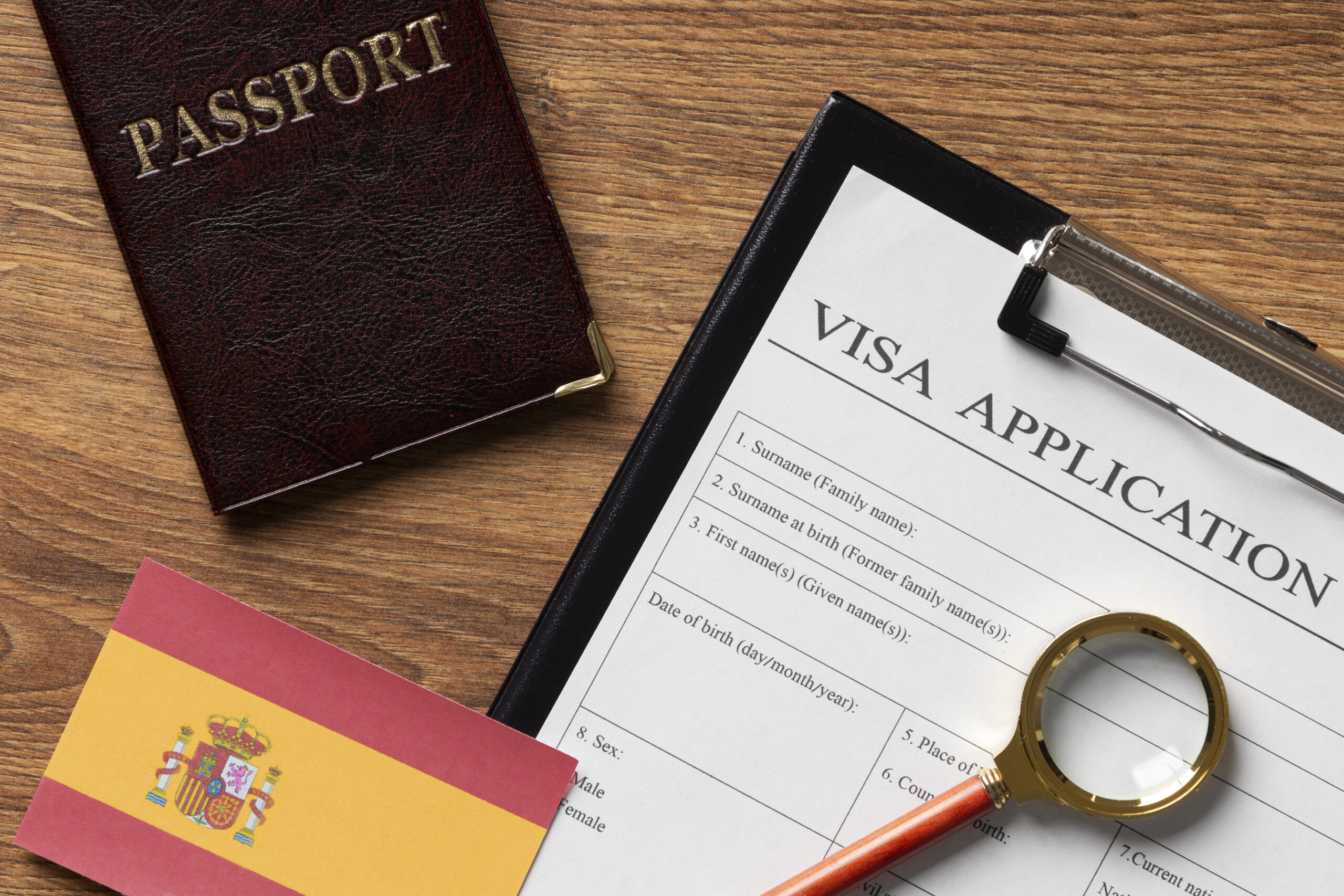Immigration to Spain | Everything you need to know about traveling to Spain 2025
- Home
- Immigration to Spain | Everything you need to know about traveling to Spain 2025

Immigration to Spain | Everything you need to know about traveling to Spain 2025
Welcome to our guide on immigration to Spain in 2025. Whether you’re planning a short visit or a long-term stay, we’ve got you covered. We’ll cover the latest updates and essential information to help your journey to Spain be smooth and successful.
From visa types and requirements to the cost of living and tips for integrating into the Spanish lifestyle, we’ve got you covered. Spain is a popular destination for travelers and expats. Its rich culture, stunning landscapes, and dynamic economy make it a great place to be.
Key Takeaways
- Understand the different types of visas and residency permits available for Spain
- Learn about the requirements for short-term and long-term stays in Spain
- Discover the cost of living in Spain and budgeting tips for a successful relocation
- Explore the process of settling in Spain, including finding accommodation and opening a bank account
- Stay up-to-date on the latest immigration to Spain policies and regulations for Spain in 2025
Overview of Immigration to Spain
Spain has always been a favorite for travelers and immigrants. Its rich culture, lively cities, and great quality of life make it a top choice. It’s clear why Spain is a magnet for those looking for new chances.
Spain’s Attractiveness as a Destination
Spain’s beauty is unmatched, from Barcelona and Madrid’s architecture to the Mediterranean’s beaches. Its strong economy, job market, and low living costs make it even more appealing for immigration to Spain. It’s a great place for those wanting to move or start anew.
Types of Visas and Residency Permits
Spain offers various visas and permits for visiting, working, or living there. You can get tourist visas, student visas, work permits, or residency permits. Knowing what you need and how to apply is key for a smooth move.
Spain offers something for everyone, whether you dream of a vacation, a career, or a new home. As you go through the immigration to Spain process, stay informed and ready. This will help you make a smooth transition.
“Spain is a land of passion, beauty, and endless possibilities. It’s no wonder it has become a top destination for those seeking a new adventure.”
Spain Tourist Visa
Are you planning a trip to Spain? Whether it’s for business, fun, or to see the culture, you’ll need a Spain tourist visa. We’ll help you understand what you need, how to apply, and how long it’s good for. This way, your trip will be easy and enjoyable.
Requirements for a Spain Tourist Visa
To get a Spain tourist visa, you’ll need a few things:
- A valid passport with at least 6 months left on it
- A filled-out and signed visa application form
- A recent photo that fits in a passport
- Proof you have a place to stay, like a hotel booking or a letter from a host
- Enough money to cover your stay in Spain
- Travel medical insurance that covers at least €30,000
Application Process and Duration
You can apply for a Spain tourist visa at the Spanish embassy or consulate in your country. It takes some time, so apply 4-6 weeks before you plan to go. This gives them enough time to process it.
The Spain tourist visa lets you stay for up to 90 days in 180 days. You can’t extend it, so plan your trip carefully.
Remember, the rules for a spain tourist visa can change. Always check the latest info on the Spanish government’s website or with your local embassy or consulate.
Short-term Visa
If you’re planning a short visit to Spain, a short-term visa might be what you need. This visa is for those who want to visit for tourism, business, or other approved reasons. We’ll look at what you need, how long you can stay, and any limits of the Spanish short-term visa.
Requirements for Short-term Stay
To get a short-term visa for Spain, you’ll need to provide some documents. These include a valid passport, proof of where you’ll stay, and enough money for your trip. You might also need to explain why you’re visiting and show you’ll go back home after your trip.
Duration and Limitations
The short-term visa lets you stay up to 90 days in 180 days. So, you can spend up to three months in Spain in six months. Remember, this visa isn’t for work or long stays. For those, you’ll need a different visa or residency permit.
| Visa Type | Maximum Stay | Permitted Activities |
| Short-term Visa | Up to 90 days within 180-day period | Tourism, business, and other approved purposes |
Knowing the rules of the Spanish short-term visa helps you prepare for your visit. This way, you can enjoy your time in Spain to the fullest.
Visa Types for Spain
Exploring the different visa options for visiting or moving to Spain is key. Spain has various visas for travelers, students, and those wanting to work or live there. We’ll look at the visa types for spain, who can apply, how to apply, and the benefits.
Tourist Visa
The tourist visa, or Schengen visa, is for those visiting Spain for fun or short business trips. It lets you stay up to 90 days in 180 days and is good for the Schengen area, including Spain and 25 other countries.
Student Visa
International students wanting to study in Spain can get a student visa. It’s for those in recognized schools or universities and lets you stay as long as your studies last.
Work Visa
For those wanting to work in Spain, the work visa is the right choice. You need a job offer or contract from an employer to apply. This visa lets you live and work in Spain for your employment’s duration.
Residency Visa
Spain also has residency visas for long-term stays. These include options for self-employed, retirees, and those with big investments or money. Residency visas can lead to permanent residency or Spanish citizenship.
Choosing the right visa types for spain can be tricky. It’s important to know the needs and benefits of each visa to apply successfully and smoothly move to Spain.
Requirements for Traveling to Spain
Getting ready for your trip to Spain means making sure you have everything you need. Whether you’re going for a short visit or a longer stay, knowing what documents you need and the importance of health and travel insurance is key. It helps make your trip smooth and stress-free.
Documentation Needed
You’ll need a valid passport to enter Spain. Make sure your passport is good for at least six months after your planned arrival date. Depending on where you’re from and why you’re visiting, you might also need a visa. It’s important to check the requirements for traveling to Spain to see if you need one.
- Valid passport with at least 6 months of validity
- Appropriate visa, if required (e.g., tourist, business, student)
- Proof of sufficient funds for your stay
- Confirmed accommodations or a letter of invitation, if applicable
Health and Travel Insurance
While health and travel insurance isn’t required by law to enter Spain, it’s a good idea to get it. It can help protect you financially if you face unexpected medical costs, trip cancellations, or other issues during your travel to Spain.
When picking your insurance, think about coverage limits, deductibles, and any health conditions you have. This way, you’ll be well-protected during your time in Spain.
Immigration to Spain
Getting a permanent home in Spain can seem tough. But, there are many ways to make it happen. We’ll cover employment, family, and investment paths to guide you.
Employment-Based Immigration
Work visas are a common way to live in Spain. Companies can sponsor you, helping with the visa process. It’s great for skilled workers and entrepreneurs.
Family-Based Immigration to Spain
Family ties can also lead to residency. If your relatives are Spanish, you might qualify. You’ll need to show your family bond and meet certain rules.
Investment-Based Immigration to Spain
Investing in Spain can also get you residency. This means buying property, starting a business, or investing in bonds. It’s a big step but can be rewarding.
Choosing your immigration to Spain path is important. Make sure you understand the legal steps. immigration to Spain experts can help make the move smoother.
“Spain is a land of opportunity, rich in culture and natural beauty. Embarking on the immigration to Spain journey can be a rewarding experience, opening the door to a new and fulfilling chapter in your life.”
Settling in Spain
Starting your journey to Spain is thrilling. But, the real challenge is settling in once you arrive. We’ll share tips on finding a place to live and opening a bank account. These steps are key to making Spain your new home.
Finding Accommodation
Finding a cozy place to live is a top priority. Spain has many options, whether you want to rent or buy. Start by checking out websites like Idealista or Fotocasa for a wide selection of properties.
When renting, you’ll need to show proof of income and a security deposit. For buying, local real estate agents can help. They’ll guide you through the process and find a property that fits your needs and budget.
Opening a Bank Account
Getting a local bank account is essential. It makes managing money easier, from getting paid to paying bills. Most Spanish banks welcome non-residents and have accounts for international residents.
To open an account, you’ll need ID, proof of address, and possibly a Spanish tax number (NIE). With your account ready, you can handle your finances smoothly in Spain.
| Accommodation Type | Average Monthly Rent (€) | Typical Deposit Required |
|---|---|---|
| 1-bedroom apartment in city center | 800 – 1,200 | 1-2 months’ rent |
| 3-bedroom apartment in city center | 1,200 – 2,000 | 1-2 months’ rent |
| 2-bedroom apartment in suburbs | 600 – 900 | 1-2 months’ rent |
Cost of Living in Spain
Planning to stay or move to Spain? Knowing the cost of living is key. We’ll cover typical expenses like housing, food, and transportation. Plus, we’ll share budgeting tips to manage your money well in Spain.
Expenses Breakdown
The cost of living in Spain changes based on where you are, your lifestyle, and what you like. Here’s a general idea of what you might spend:
- Housing: Rent for a one-bedroom apartment in the city center costs €700 to €1,200 monthly. In the suburbs, it’s about €500 to €900.
- Food: Buying groceries for a balanced diet costs €200 to €400 monthly. Eating out at mid-range places costs €10 to €25 per meal.
- Transportation: Monthly passes for buses and metro cost €30 to €50. Fuel prices are generally lower than in many European countries.
- Utilities: Electricity, water, and internet cost about €100 to €200 monthly. This depends on how much you use and the size of your apartment.
- Healthcare: Healthcare costs vary. EU citizens might get it for free. Others might pay €50 to €200 monthly for private insurance.
Budgeting Tips
To manage your money well in Spain, try these budgeting tips:
- Make a detailed budget that includes all your expected costs. This includes rent, utilities, food, transportation, and fun activities.
- Save on housing by sharing an apartment or living in a less central area.
- Shop at local markets and supermarkets to cut down on food expenses.
- Use public transport or get a bike to save on travel costs.
- Compare healthcare options to find the best and most affordable one for you.
Understanding Spain’s cost of living and using these budgeting tips can help you enjoy your time here. You’ll stay financially stable and make the most of your resources.
Frequently Asked Questions about Immigration to Spain
As you plan to move to Spain, you might have many questions. We’ve gathered answers to the most common ones to help you.
What are the most common types of visas for Spain?
Spain offers several visa types, like tourist, short-term, and residency permits. The visa you need depends on your stay’s purpose and length.
How long does the visa application process take?
The time to get a visa varies by type and the embassy’s workload. It’s wise to apply 2-3 months early to avoid delays.
Can I work in Spain with a tourist visa?
No, tourist visas don’t allow work in Spain. For employment, you need a work visa or a residency permit.
What are the requirements for obtaining a Spanish residency permit?
To get a residency permit, you need to show you have enough money, a valid reason to stay (like work or study), and meet health and insurance standards.
How can I open a bank account in Spain as a foreigner?
To open a bank account in Spain, you’ll need your passport, a Spanish address, and proof of your immigration to Spain status. Some banks might ask for a minimum deposit.
What is the cost of living in Spain compared to other European countries?
| Expense | Spain | Germany | France |
|---|---|---|---|
| Rent (1-bedroom apartment in city center) | €700 | €900 | €950 |
| Groceries (monthly for one person) | €200 | €300 | €250 |
| Public Transportation (monthly pass) | €40 | €80 | €75 |
As shown, living in Spain is cheaper than in other major European countries. This makes Spain a great choice for budget-conscious people.
“Spain is a vibrant and welcoming country that offers a high quality of life, with a rich cultural heritage, stunning natural landscapes, and a favorable cost of living. Navigating the immigration to Spain process can seem daunting, but with the right information and preparation, you can make your move to Spain a seamless and rewarding experience.”
We hope this FAQ has helped you understand immigrating to Spain better. If you have more questions, feel free to contact us.
Conclusion
In our guide, we’ve shared a lot about immigration to Spain in 2025. You now know about the Spain tourist visa and short-term visa rules. We’ve also covered the different visa types for Spain.
We’ve talked about what you need to travel to Spain. This includes important documents and health insurance. Our guide helps you whether you’re visiting for a short time or moving there for good.
We hope this article has helped you feel ready for your Spanish adventure. Spain is full of culture, beautiful landscapes, and friendly people. Let our guide help you discover all the amazing things Spain has to offer.
FAQ
What are the different types of visas available for traveling to Spain?
Spain has many visa options. You can get a tourist visa, short-term visa, work visa, or residency permit. The right visa depends on why and how long you plan to stay.
What are the requirements for obtaining a Spain tourist visa?
For a Spain tourist visa, you need a valid passport and a filled-out application form. You also need proof of where you’ll stay, enough money, and health insurance. The exact needs might change based on where you’re from.
How long can I stay in Spain with a short-term visa?
A short-term visa lets you stay up to 90 days in 180 days. It’s good for short visits, like for business, tourism, or family.
What are the different types of visas available for long-term stays in Spain?
For longer stays, you might get a work visa, student visa, or residency permit. Each has its own rules and benefits, based on your situation and goals.
What documentation do I need to travel to Spain?
To go to Spain, you need a valid passport and the right visa (if needed). You also need proof of where you’ll stay and enough money. It’s wise to have health and travel insurance too.
What is the process for immigrating to Spain?
Immigrating to Spain depends on your reason, like work, family, or investment. You’ll need to get the right residency permits and go through the application steps.
How much does it cost to live in Spain?
Living costs in Spain vary by region and lifestyle. You’ll spend on housing, food, transport, utilities, and more. Look up costs in your future area to plan.
What are the common challenges when settling in Spain?
Challenges in Spain include finding a place to live, opening a bank account, and getting used to healthcare and culture. But, with good planning and support, you can overcome these hurdles.




 Contact Us
Contact Us 






